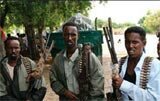
African Union forces in Somali and Somali government forces are geared for combat against militants in the capital city Mogadishu. Eyewitness reports claim that hordes of rebels, loyal to al-Qaeda linked al-Shabab, have stormed into Mogadishu with truck-loads of weapons.
The UN and U.S backed Somali transitional government of president, Sharif Sheikh Ahmed recently promised to launch an offensive to take control of the country. However, reports say the rebels are prepared to resist the government.
The report that al-Shabab rebels and government forces are on the verge of a serious brawl, has caused many Somalis to flee the capital. One of the many running away from the impending clashes told AFP news agency that neither the government forces nor the rebels cared about civilians.
“The government has vowed to retake the city, rebels are going to stick to their bastions and the civilians are going to be the only victims, as always bearing the brunt of the war,” the man was quoted as saying.
SEE ALSO
• Botswana-Zimbabwe diplomatic relations take a damaging turn
• Chad and Sudan seek better ties in a surprise move
• East African Community develops a draft conflict prevention, management and resolution (CPMR) mechanism
• All articles related to Conflicts
Another local resident, Abdullahi Mohamed told reporters that: “Eighteen trucks – big trucks – packed with Shebab militants drove through Lafole. I saw hundreds of new Shebab militants deployed around Hodan and KPP (Casa Populare) districts this morning… They are heavily armed with machine guns and anti-aircraft weapons.”
Analysts believe the rebels coming in from the south will strengthen an already numerous and organized group of fighters in Mogadishu. Human Rights Watch say gunfights and shelling are common in the city – and civilians are killed by both sides.
The transitional government controls only a small part of Mogadishu while the rest of the country is divided by warlords, al-Shabab and other Islamist militias. Since 1991, Somalia has been wracked by violence as it has had no functioning central government, for almost 20 years.
While the rebels prepare to do battle with the Somali government, they have their eye on Kenya’s role in supporting the Somali government against them. “We are not at war with Kenya at the moment but we are monitoring their acts of aggression in our country which have prompted us to be alert,†argues al-Shabab spokesman, Sheikh Hassan, who is based in the strategic southern city of Kismayo.
“The Kenyan government has been recruiting Somali soldiers who have now been armed and are ready to fight us. We will teach them a historic lesson that will not be forgotten,” he said on the Shebab-run Radio Andalus.
While Kenya has utterly denied the accusation, several regional intelligence sources have confirmed that it has helped train and equip Kenyan and Kenya-based Somalis to take part in the offensive against al-Shabab rebellion.
The UN’s refugee agency is already struggling to assist the million people displaced in 2007 and the quarter million more that have been displaced since May.
A year ago, President, Sharif Sheikh Ahmed was hailed by Washington as Somali’s best hope of peace in years. But the moderate Islamist has since failed to make any progress in his peace plans, and is now boxed in his Mogadishu compound, under African Union Peacekeeping protection. He celebrated late last month his first year in office under a hail of mortar fire.
Sour



